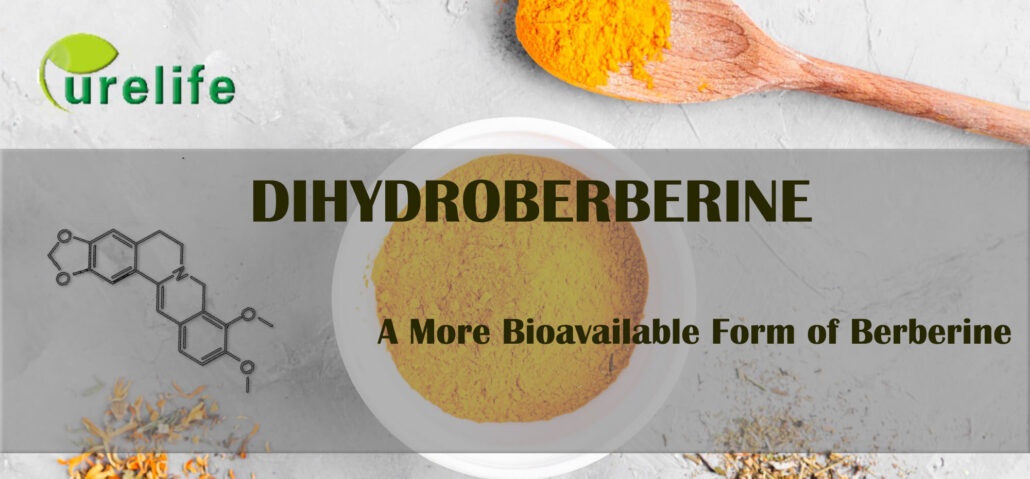Dihydroberberine Supplement
Product name: Dihydroberberine, Dihydroberberine Supplement
Other name: Dihydroumbellatine, Berberine, Berberine HCl
CAS number: 483-15-8
Appearance: Yellow powder
MF: C20H19NO4
MW: 337.375
Specification: Dihydroberberine 98% by HPLC

What is Dihydroberberine Supplement?
Dihydroberberine (DHB) is a hydrogenated derivative of berberine, a natural alkaloid found in plants like goldenseal, barberry, and Chinese goldthread. Berberine is known for its benefits in blood sugar control, cholesterol management, and metabolic health, but it has poor absorption in the gut. Berberine is an isoquinoline alkaloid with a characteristic ring – like structure. In dihydroberberine, two hydrogen atoms are added to the berberine molecule, which modifies its chemical and physical properties.
Compared to berberine, Dihydroberberine has improved solubility in water. This property is significant as it can enhance its absorption in the body, as substances need to be in a soluble form to be effectively taken up by the digestive system and enter the bloodstream. So, dihydroberberine is a more bioavailable (2-5x higher absorption) form of berberine.
Differences Between Berberine & Dihydroberberine
| FEATURE | DIHYDROBERBERINE | BERBERINE |
| BIOAVAILABILITY | 2-5X HIGHER ABSORPTION | LOW (<5%) |
| DOSAGE | 100–500 MG/DAY | 500–1,500 MG/DAY |
| SIDE EFFECTS | FEWER GI ISSUES REPORTED | MAY CAUSE DIGESTIVE UPSET (DIARRHEA, BLOATING) |
| MECHANISM | SAME, BUT FASTER & STRONGER | ACTIVATES AMPK (ENERGY METABOLISM REGULATOR) |
How Does Dihydroberberine Work?
Absorption: One of the most notable features of dihydroberberine is its superior bioavailability compared to berberine. Berberine has relatively poor oral bioavailability due to factors like low solubility and extensive first – pass metabolism in the liver. Dihydroberberine can be absorbed more readily in the gastrointestinal tract, reaching higher concentrations in the bloodstream. This means that a smaller dose of dihydroberberine may be as effective as a larger dose of berberine.
Metabolism and Elimination: Once absorbed, dihydroberberine is metabolized in the body. It may be further transformed into other metabolites, some of which may also contribute to its biological effects. The elimination process is also an important aspect; it is excreted from the body mainly through the kidneys and feces, and the rate of elimination affects its duration of action in the body.
Blood Sugar Regulation
Insulin Sensitivity: Dihydroberberine supplement can increase insulin sensitivity, which means that cells in the body, such as muscle and adipose cells, can respond more effectively to insulin. Insulin is a hormone that helps cells take up glucose from the bloodstream. By improving insulin sensitivity, dihydroberberine allows cells to absorb glucose more efficiently, thereby reducing blood glucose levels.
Glucose Metabolism: It can also regulate key enzymes involved in glucose metabolism. For example, it may activate AMP – activated protein kinase (AMPK), an enzyme that plays a central role in cellular energy homeostasis. Activation of AMPK promotes glucose uptake and utilization in cells and inhibits glucose production in the liver.
Lipid Metabolism: Cholesterol and Triglyceride Regulation: Dihydroberberine can affect the synthesis, transport, and breakdown of lipids. It may inhibit the activity of enzymes involved in cholesterol synthesis in the liver, such as HMG – CoA reductase, leading to a decrease in cholesterol production. It can also enhance the clearance of triglyceride – rich lipoproteins from the bloodstream, reducing triglyceride levels.
Adipocyte Function: It can influence the function of adipocytes (fat cells). Dihydroberberine may promote lipolysis (the breakdown of fat) in adipocytes and inhibit adipogenesis (the formation of new fat cells), which helps in maintaining a healthy body fat composition.
Anti – inflammatory and Antioxidant Effects
Inflammatory Pathways: Dihydroberberine can suppress the activation of pro – inflammatory signaling pathways, such as the NF – κB pathway. This leads to a decrease in the production of pro – inflammatory cytokines like TNF – α, IL – 6, and IL – 1β, which are involved in the development of chronic inflammation and various diseases.
Antioxidant Defense: It can enhance the body’s antioxidant defense system. Dihydroberberine may increase the activity of antioxidant enzymes such as superoxide dismutase (SOD), catalase (CAT), and glutathione peroxidase (GPx), which help neutralize free radicals and reduce oxidative stress in cells.
What is Dihydroberberine supplement benefits?
Dihydroberberine for Diabetes Management
Due to its ability to regulate blood sugar levels, dihydroberberine is of great interest in the management of type 2 diabetes. It can be used as an adjunct to diet, exercise, and conventional diabetes medications to improve glycemic control, potentially reducing the risk of diabetes – related complications such as cardiovascular disease, neuropathy, and nephropathy.
Dihydroberberine supplement for Cardiovascular Health
By lowering cholesterol and triglyceride levels and reducing inflammation and oxidative stress, dihydroberberine can contribute to improved cardiovascular health. It may help prevent the development of atherosclerosis (the hardening and narrowing of arteries), reduce the risk of heart attacks and strokes, and improve overall blood vessel function.
Dihydroberberine for Weight Management
Its effects on lipid metabolism and adipocyte function make it a potential aid in weight management. By promoting fat breakdown and inhibiting fat storage, it may help individuals lose weight or maintain a healthy body weight, especially when combined with a balanced diet and regular exercise

Dihydroberberine supplement side effects?
General Safety: Dihydroberberine is generally considered safe when taken within the recommended dosage range. However, like any supplement, it may cause side effects in some individuals.
Safety Data: Limited long-term safety data (most studies are on berberine).
Side Effects: Common side effects may include mild gastrointestinal discomfort, such as nausea, diarrhea, or abdominal pain. These side effects are usually transient and may subside as the body adjusts to the supplement.
Drug Interactions: Dihydroberberine may interact with certain medications. For example, it may interact with diabetes medications, blood – thinning drugs, and medications for high blood pressure. Therefore, it is important to consult a healthcare provider before starting to take dihydroberberine, especially if you are taking other medications.
Dihydroberberine supplement recommended dosage
The recommended dosage of Dihydroberberine can vary depending on the specific product and individual needs. However, a common dosage range for dihydroberberine supplementation is typically between 100-500 milligrams per day.
For Blood Sugar Management
Starting Dose: For individuals new to dihydroberberine, a common starting dose is around 100 – 200 mg per day. This allows the body to gradually adjust to the supplement and helps to assess how well it is tolerated.
Maintenance Dose: Once the body has adapted, a maintenance dose of 200 – 500 mg per day is often recommended. This range has been studied in some research for its potential to improve insulin sensitivity and regulate blood glucose levels. The total daily dose is usually divided into two or three smaller doses and taken with meals to enhance absorption.
For Lipid Management
To support healthy cholesterol and triglyceride levels, a dosage of 200 – 500 mg per day is typically suggested. Similar to blood sugar management, it is advisable to split the daily dose and take it with food.
It’s important to note that these are general guidelines, and the optimal dosage for you may differ. Always follow the instructions on the product label and seek advice from a qualified healthcare professional, such as a doctor or a registered dietitian, before starting any new supplement regimen. They can provide personalized recommendations based on your specific health needs and circumstances
.WHERE TO BUY HIGH QUALITY Dihydroberberine?
Purelife bio is a professional & reliable supplier of the raw material of Dihydroberberine powder.
Our specification: Dihydroberberine 98% by HPLC
If you need certificate of analysis, MSDS, pricing quotation, test spectrum or have any other technical questions, please kindly drop us an email at info@purelife-bio.com, a timely and professional support will be provided upon your request.

